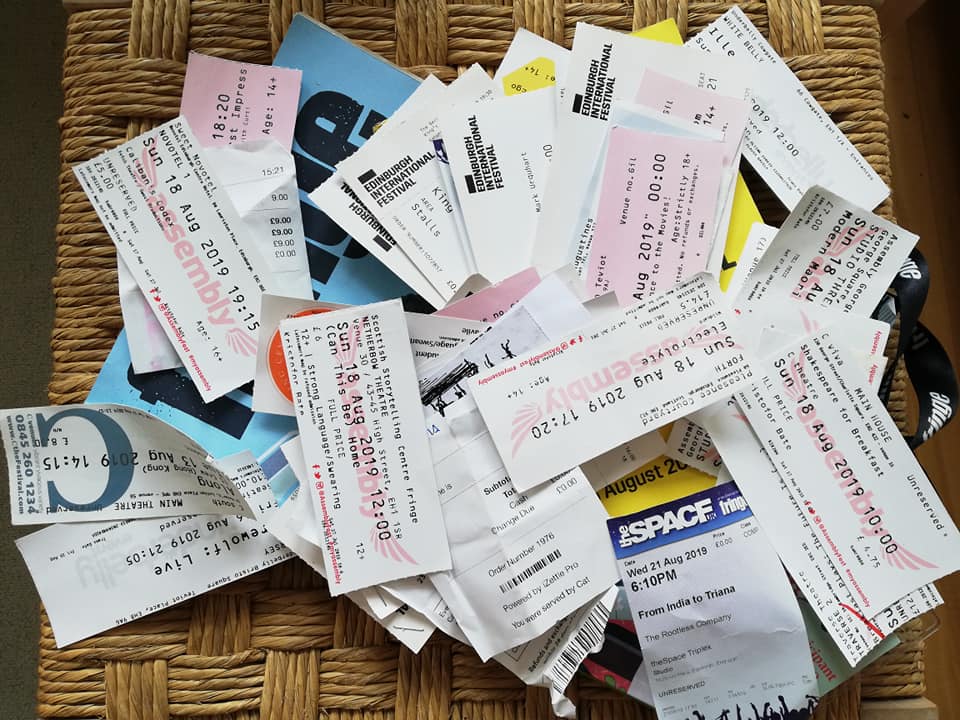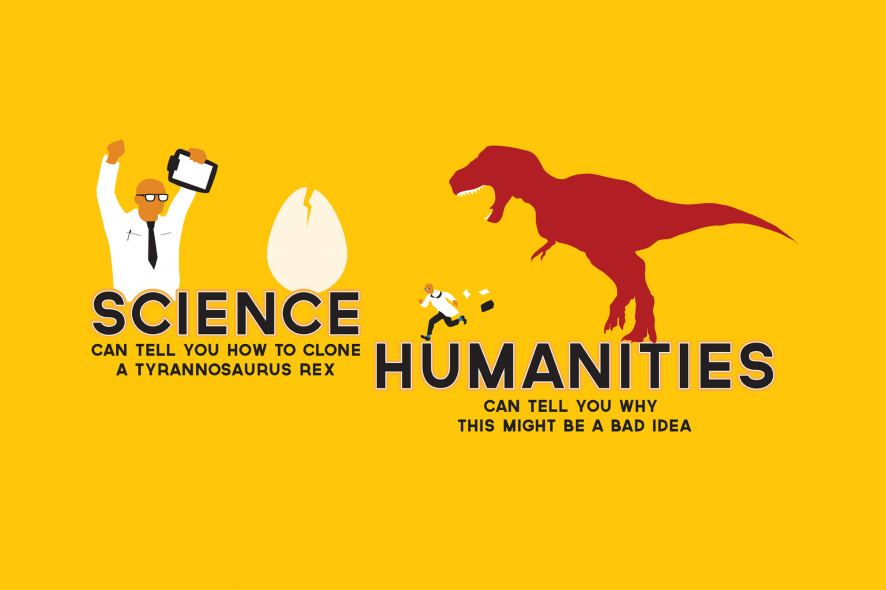It’s now July and ordinarily, I would have begun the countdown to the Edinburgh Fringe by now but it’s also 2021, Year Two of Our Lord Coronavirus, and I don’t wanna. I’m still mourning the fact that this pandemic gave us an opportunity to make things right, to do better, and the gatekeepers just chucked it in the bin like the soggy flyer they just took from you on the Royal Mile because they had no intention to come see your show anyway.
If you are an Edinburgh resident or a person involved with the performing arts, you’ll have heard all the complaints that had been escalating in the past decade or so. In a nutshell, the Fringe got too big, too expensive, too overwhelming – many others have written eloquently about all these issues in the past few years so I am not going to repeat them (some links are provided here, but there are many others that you can find). I’m just going to focus on my personal experience of the past 3 years.
We all have a love/hate relationship with the Fringe, there’s no denying, but 2019 was the year that this dynamics definitely skewed way more towards the hate side for me. I’ve done full runs, short runs, I’ve worked as a stage manager, flyerer, venue manager, tech operator, producer and director at the Fringe, I’ve done free shows in pub basements and I’ve done shows in some of the ‘Big 4’, I’ve done profit-share (also known as zero pay or if you’re lucky, you get enough for a meal deal), I’ve been paid flat rates and I’ve been paid by the hour, and I went on ‘Fringe Binges’ with a friend, trying to watch as many shows as it was logistically and humanly possible within 24h. The Fringe can be extremely stressful but it can also be a lot of fun. In 2019, I didn’t have fun. I was just angry for 4 weeks.
I was angry at the quality of shows – a noticeable phenomenon across the board that year was that shows that ticked the right boxes were given the stars, the funding and the awards, even if they were poorly conceived or executed. I was angry at the prices of tickets and the bars. I was angry at the bars becoming the main event and the shows being pushed to one side. I was angry that club nights that were no different from ordinary club nights year-round were taking up space in the programme. I was angry at the person staying in the Airbnb above my Canongate flat asking me and my partner how many nights we would be staying for – the sheer realisation that folk who come here in August don’t even consider the possibility that people might actually *live* in central Edinburgh! I was angry at a distinctive shift in programming across venues, meaning all theatre and dance stopped at 7pm and all you could find after 8pm was cabaret and comedy (in addition to the aforementioned bars and club nights). Sure, I want to get absolutely wasted and go see Saucy Jack and the Space Vixens on the last night of August, when I’m not even going to remember where I live anymore, but I also want to be able to cheer up my friend who’s just been dumped by her Fringe Fling by taking her to see Titus Andronicus at midnight, or catch some edgy devised piece in some obscure attic at 2am. Those options weren’t there in 2019 and I lamented that.
I was going to have two shows at the Fringe in 2020, both at the Scottish Storytelling Centre: Debbie Cannon’s The Remarkable Deliverances of Alice Thornton and Dave Robb’s The Devil in the Belfry, both of which had done really well in other festivals (Being Human and Cymera, respectively) in 2019. When the pandemic started and many people took their work online, I chatted to both Debbie and Dave and we decided to wait it out until it was safe to return to the meatspace. The two main reasons for that decision were: financial and dramaturgical. Neither show was publicly funded, so we had to be careful with our money, which would come from other work that had also been halted. Dramaturgically speaking, we felt that both shows had been made to be experienced by an audience sharing the physical space with the performers, so we would rather not mess with the existing structure of the pieces for now. Our venue had handled the Fringe registration process for us and also handled the de-registration process, as the venue themselves decided not to offer an online Fringe programme in 2020.
The truth is, I don’t actually know what the 2020 Fringe offered at all. I know the Fringe Society received a £1.2m support package from government in June last year, but I don’t understand what that money supported. I am vaguely aware that there was a digital programme and things like Shedinburgh, but I was living in a post-thesis submission haze and didn’t have the brainspace to engage with any of it. In my head, the Edinburgh Fringe didn’t happen in 2020. Except it did, sort of. And it’s coming back, sort of, in 2021.
This is where I’m getting angry again. I wish that, like me, Debbie and Dave, the Fringe would have just taken a deep breath, assessed the context, and taken some time out for real. Now I’m angry that they announced they would open for registration before the latest lockdown ended and were still charging a registration fee upwards of £200, which would not be refunded after ticket sales started. I’m angry that they promoted a competition for small grants with a tight deadline and an application form as complex as those you fill out for a Creative Scotland Open Fund, and that basically asked you how you would change the world with £2500. I’m angry that I asked the Fringe Society Artist Development team to host a public forum to discuss these concerns and was told to host one myself, when they are on a salary to do that sort of thing and I am not. I’m angry that when I pointed that out, they said they didn’t have the capacity to organise such an event and offered to have a one-to-one phone chat with me, when I explicitly said that I didn’t want that because I was not an elected representative of the grassroots theatremakers of Edinburgh and didn’t feel comfortable having conversations that affect us all behind closed doors. I’m angry that that put an end to that conversation altogether. I’m angry that the 2021 Edinburgh Fringe programme was announced yesterday and it looks more curated than ever. This feels especially hurtful when we’ve been told over and over again that one of the reasons why the Fringe can’t possibly be better is its open-to-all nature. After a year that has been rough for all of us, during which several task forces and lobbying groups were set up to address not only the problems with the Fringe but with our industry as a whole, it is utterly disheartening to see things being handled like this. I’m also angry at the fact that many enthusiasts support a return to growth and one that can happen asap.
When I attended a safety training session with Police Scotland for Fringe venue managers a few years ago, I learned one fact that I hadn’t considered before and made a huge impression. I knew the Fringe was the largest performing arts festival in the world in terms of the number of acts in the programme. What I didn’t know until then was that in terms of audience and ticket sales, the Fringe was the third largest *event* in the world, only behind the Olympics and the FIFA World Cup. And when you think that those events usually happen in big cities like London, Rio, Tokyo, every four years, and change hosts every time, it’s INSANE that such an event happens yearly in a relatively small city like Edinburgh. It can’t be sustainable.
All these things considered, I would have liked to see a kinder, smaller, local pandemic version of the Fringe that emphasised the ‘Edinburgh’ part of its name. By all means, offer a digital programme too because we all know that this benefits a lot of people, and this could be the role of a reduced Fringe Society. But in terms of the meatspace, wouldn’t it be lovely if, for example, we had focused on the recovery of local venues only, those that are here year-round? What if we had given full Fringe admin power to local venues and waived the registration fee for Edinburgh acts altogether, then distributed that sweet support money in a fair way among local artists and companies to do their shows in these venues, which in turn would make tickets cheaper or even free for Edinburgh residents…? This way, we could still have a Fringe, we could pump some cash directly into the local economy, and also keep audiences, performers and venue staff safer from infection, which is something that I haven’t even started to mention because it should be obvious by now. Granted, this version of the Fringe wouldn’t be the largest, the most world-beating or whatever, but it would also not be the most expensive, the most stressful or the deadliest.
Is it unrealistic? I don’t know. I also remember attending a panel at the Fringe a few years ago (maybe it was 2014?), when the convener asked the invited speakers to define ‘radical theatre’. All of them said energetic, even violent, things, like ‘we need to blow shit up’ and ‘take people down’, etc. When the question was put to the audience, I was mindful of a show I had just seen the day before, a low-key, low-budget act that entailed a guy balancing rocks for an hour with a wee speaker gaffa-taped to his head that spoke some metaphysical text over it. It was small, simple, gentle, experimental, challenging, weird, and surprisingly enjoyable. That, to me, was radical.




Recent Comments